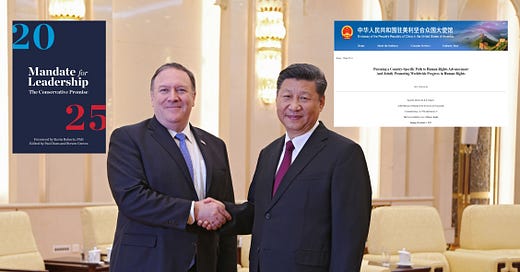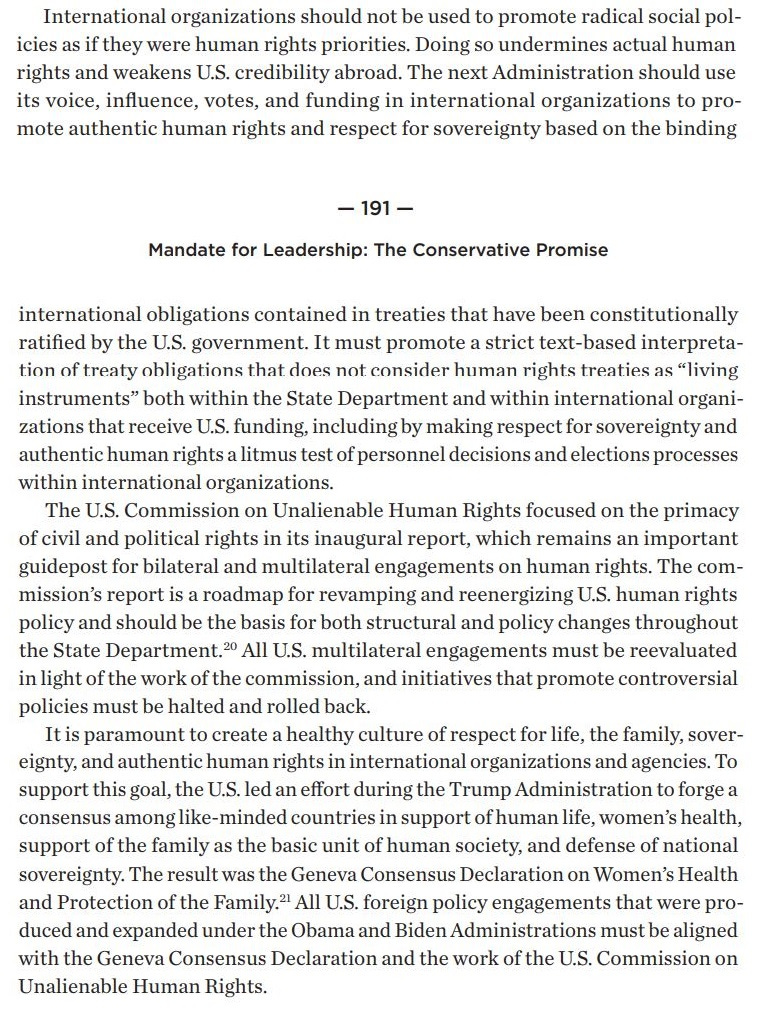Team Trump’s gift to the Chinese Communist Party on human rights
Project 2025 adopts the CCP strategy of redefining human rights to suit Party ideology
Project 2025, the blueprint for how a second Trump Administration would govern, seeks to impose a restrictive, ideologically-determined definition of human rights that would not only reverse rights for Americans (particularly LGBTQ and reproductive rights) but also legitimize the Chinese Communist Party’s (CCP) effort to eviscerate the international human rights regime and replace it with model where political parties pick and choose rights according to their ideology.
(The relevant passage from Project 2025’s “Mandate for Leadership” (p. 191) is excerpted below.)
“Authentic human rights” – U.S. politicians decide what rights people can have
“Authentic human rights” and “actual human rights” are terms Project 2025’s authors use to claim that the human rights that every person around the world are entitled to enjoy are not defined by the Universal Declaration of Human Rights (UDHR) but rather by what their ideological cohort says. It would limit U.S. respect for international human rights standards, globally, to those treaties the U.S. has ratified. In an international parallel of strict constructionism, the document promotes “a strict text-based interpretation of treaty obligations that does not consider human rights treaties as ‘living instruments.’”
Part of a larger ideological plan to redefine human rights
This isn’t something Project 2025 invented. It is the latest in a long-running plot by conservative activists to redefine human rights on terms that fit their ideology. It’s part of an insidious plan dressed in legal-sounding language designed to eliminate “equality” as a fundamental pillar of human rights law. Project 2025 praises the “Commission on Unalienable Rights,” a taxpayer-funded effort created by President Trump’s Secretary of State, Mike Pompeo. The Commission said human rights were “endowed by the Creator,” claimed universal human rights must be defined through a U.S. lens, and asserted a hierarchy of rights putting religious freedom and property rights at the top and relegating freedom from discrimination to the basement. Project 2025 explicitly extols the Commission for setting the “primacy of civil and political rights in its inaugural report,” a 60-page exhibition of the pseudo-intellectualism of this endeavor.
Goal: eliminate the legal basis for LGBTQ and reproductive rights
This goal is crystal clear. Pompeo spoke dismissively against “new rights.” Heritage hosted an event where a panelist criticized “newly manufactured human rights" as a threat to what he claims are Christian values. Human rights advocates, noting previous statements and work by Pompeo and Commission members, characterized it as an attempt to reinterpret human rights law to exclude rights for LGBTQ persons and the right to abortion and reproductive freedom. This foreign policy plank of Project 2025 conforms with its domestic policy’s repeated attacks on “abortion and pro-LGBT initiatives.”
Project 2025 also gives weight to the “Geneva Consensus Declaration on Women’s Health and Protection of the Family” despite its meaninglessness in international law. The Trump Administration (led by Pompeo) teamed up with several autocratic governments (many of whom persecute LGBTQ persons as criminals) to produce a piece of paper claiming no "international right to abortion.” Both the U.S. and Brazil have since revoked their signatures.
Corrodes the international human rights system and the principle of universality
Project 2025 would have the U.S. government impose the authors’ narrow and constrictive view of human rights on the rest of the world by directing the “next Administration [to] use its voice, influence, votes, and funding in international organizations to promote authentic human rights and respect for sovereignty based on the binding international obligations contained in treaties that have been constitutionally ratified by the U.S. government.”
This contradicts and corrodes the UDHR, the cornerstone document of universal human rights law from which all core international human rights instruments derive. The U.S. helped lead the drafting of the UDHR in 1948. Its first words are: “All human beings are born free and equal in dignity and rights.” Project 2025 and the Commission undermine this core principle by rejecting the application of “free and equal” in cases that don’t suit their ideology, such as LGBTQ persons and women’s bodily autonomy, and weaken the entire system.
By insisting that international organizations abide only by those treaties that the United States has ratified,[1] Project 2025 is blatantly rejecting the essential concept of the universality of human rights, and engages in a bigoted, neo-imperialist effort to impose their narrow U.S.-centric view on other countries, seeking to deny the rest of the world the ability to enjoy rights they are entitled to enjoy under international law.
A gift to the CCP
The United States wouldn’t be the only country seeking to impose its own restrictive definition of human rights on the world. China is doing this right now. Project 2025 would have a Trump Administration mimic the behavior of the Chinese Communist Party (among the many, many ways they mimic the CCP, see Part 1: Project 2025: a blueprint for CCP-style governance of America.)
The Chinese government is engaged in an effort to promote its own vision of human rights and bend the UN system of human rights law and bodies to suit the ideology of the Party. This is exactly what Project 2025 wants the U.S. to do within international organizations.
China is “Pursuing a Country-Specific Path to Human Rights Advancement” according to Foreign Minister Wang Yi. This is exactly what Project 2025 seeks to have the U.S. do, by restricting the definition of human rights to U.S.-specific laws and treaty obligations.
If we want to encourage the Chinese government to respect the human rights of its citizens, the United States will lose all moral authority if we copy the CCP strategy on human rights.
The CCP holds that human rights should be subject to the particular conditions in a country. That’s what Project 2025 says too. If U.S. officials say that the human rights Americans are allowed to enjoy are determined by the ruling Party, rather than by international standards, then U.S. officials would forfeit the ability to appeal to international institutions to monitor, assess and seek accountability for human rights violations in China. In turn, Chinese officials could just use the America-endorsed country-specific principle to deflect criticism.
Thus, adopting the restrictive, ideological definition of human rights as pushed by Project 2025 and the Commission on Unalienable Rights would be a huge gift to the Communist Party of China. I think we need more debate and attention on this.
Excerpt from Project 2025:
This is third in a series on Project 2025. Part 1, Project 2025: a blueprint for CCP-style governance of America, analyzed the similarities between the plan’s consolidation of executive power in the Party Leader and imposition of Party control over federal agencies and personnel and the CCP model. Part 2, The anti-Chinese racism of Project 2025, looks at how it applies essentialism to Chinese people and calls them naturally aggressive, which is racism.
[1] The U.S. has ratified only three of the nine core international human rights treaties: International Covenant on Civil and Political Rights, International Convention on the Elimination of All Forms of Racial Discrimination, and Convention against Torture. Signed but not ratified: International Covenant on Economic, Social and Cultural Rights, Convention on the Elimination of All Forms of Discrimination against Women, Convention on the Rights of the Child, Convention on the Rights of Persons with Disabilities. Neither signed nor ratified: International Convention on the Protection of the Rights of All Migrant Workers and Members of Their Families, International Convention for the Protection of All Persons from Enforced Disappearance.




